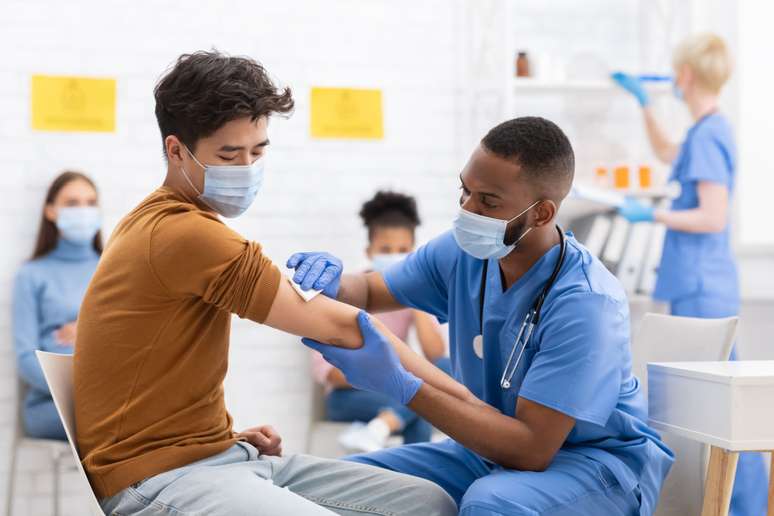The doctor explains the importance of immunization to enjoy holidays in different destinations
The year 2023 enters its final stretch, Christmas is approaching, panettone is already starting to appear on market shelves and holiday plans are in full swing. Whether it’s rest, fun or new adventures, planning involves a number of issues, from budgeting, choosing a destination, planning itineraries and tours, dressing appropriately and packing your bags.
In the midst of all this there is a fundamental element that cannot be forgotten when planning your holiday: the vaccination calendar. Up-to-date vaccinations are essential to ensure a safer holiday. After all, it is a time of great movement of people from all over and a time of greater concentration of people in certain places and attractions.
Furthermore, each destination has different diseases and infectious agents in its environment that we can come into contact with when we travel. So, being protected is an important part when planning your vacation. No one wants to run out or have any problems during the party!
Always follow medical recommendations
According to Ana Rosa dos Santos, infectious disease doctor and immunization consultant at Sabin Diagnóstico e Saúde, depending on the destination chosen for travel, the chances of a person getting sick or spreading diseases increase due to exposure to certain agents and vectors , especially if they are not vaccinated…
“Is important that traveler pay attention not only to the vaccination recommendations for the region you will visit, but also to the recommendations established by your country and by some regions and continents to have a peaceful trip and be protected against some infectious agents”, he recommends.
Countries with tropical climates deserve attention
In tropical countries, such as Brazil itself, its South American and African neighbors, it is important to be up to date with the yellow fever vaccine. The vaccine against this disease must be administered every ten years for life. In some places, vaccination against certain diseases may even be mandatory to enter the country.
“To the vacation These are moments of leisure and relaxation, it is not worth putting your plans at risk because you haven’t been vaccinated before”, underlines the infectious disease specialist. “It is also worth reiterating that having the vaccination calendar is important even if you stay at home”, underlines Ana Rosa dos Santos.

Vaccinations to catch up on
Here in Brazil the summer period (December-March) is characterized by rain and an increase in water circulation. Aedes aegizicarrier of the virus that causes dengue fever, a disease that becomes more common at this time of year.
COVID-19 also remains a concern, especially in spaces that foster constant crowding viral mutations. Vaccines are available for both diseases. Additionally, for domestic destinations, vaccines against yellow fever, hepatitis A and hepatitis B will also help make travel safer.
When to get vaccinated before travel?
Vaccination not only protects the individual receiving the immunization, but also contributes to collective protection by preventing the spread of contagious diseases. Therefore, when packing before your next adventure, it’s important not to forget to include your vaccination checklist of basic necessities at least 4 weeks before departure to enjoy your trip.
Diseases and regions at highest risk
Below, discover the 5 diseases and the regions most at risk for each of them that are already preventable through vaccines:
1. Measles
For those who embark Europe You should protect yourself from measles. Since 2011, the continent has been facing an epidemic of the disease. Therefore, unimmunized travelers and those who are unsure should check whether they have a full two-dose MMR vaccine schedule before traveling to European countries. Africa, Asia and Oceania also have outbreaks of the disease.
2. Whooping cough
Numerous cases occur in several developed countries, affecting people who, over time, have lost their immune defenses. If you were vaccinated as a child or teenager, today you need to get a dose of the Tdap vaccine, which aims to prevent whooping cough.
dTpa protects against whooping cough, diphtheria and tetanus. This immunization is also associated with the inactivated polio vaccine (dTpa/VIP), another disease that no longer circulates in the Americas, but still circulates in some African countries.
3. Hepatitis A
Anyone traveling to places where hepatitis A is endemic, such as some regions of Latin America, sub-Saharan Africa and southwest Asia, must be vaccinated. In these places the endemic has different levels ranging from high to medium and the vaccine represents safe and effective protection.
4. Hepatitis B
Non-immunized people traveling to highly endemic countries are at high risk of hepatitis B virus infection. It is a sexually transmitted disease and can be spread through habits such as unprotected sex, shared drug use, tattoos made with non-disposable materials, etc. others.
5. Meningococcal meningitis
The vaccine is essential for anyone traveling to the region known as the Meningitis Belt in Africa. Immunization is even a requirement of the Saudi Arabian Ministry of Health. The Belt crosses the African continent from Senegal to Ethiopia.
Meningococcal meningitis is an endemic disease transmitted by an asymptomatic carrier, that is, from person to person, mainly in crowds, and has great epidemic potential. The quadrivalent meningococcal meningitis vaccine against serogroups A, C, W135, Y is authorized for use in Brazil and is available in immunization clinics.
By Anne Candal Pinheiro
Source: Terra
Ben Stock is a lifestyle journalist and author at Gossipify. He writes about topics such as health, wellness, travel, food and home decor. He provides practical advice and inspiration to improve well-being, keeps readers up to date with latest lifestyle news and trends, known for his engaging writing style, in-depth analysis and unique perspectives.






-vbhxtppar29g.jpg)


